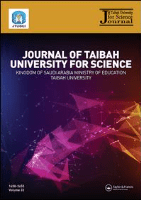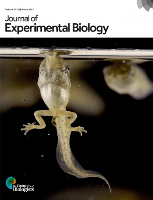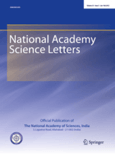
Trakya University Journal of Natural Sciences
Scope & Guideline
Exploring Interdisciplinary Frontiers
Introduction
Aims and Scopes
- Biological Sciences:
The journal emphasizes research in biological sciences, including studies on plant biology, microbiology, and zoology, often exploring the ecological and physiological aspects of organisms. - Environmental Research:
There is a strong focus on environmental sciences, particularly studies that assess ecological impacts, biodiversity, and the effects of human activities on natural ecosystems. - Pharmaceutical and Nutraceutical Research:
The journal publishes studies on the pharmacological effects of natural compounds, including investigations into their potential therapeutic benefits and mechanisms of action. - Molecular and Cellular Biology:
Research in molecular biology, including gene expression studies and cellular responses to various treatments, is a significant area of focus, highlighting advances in biotechnology. - Applied Research:
The journal also covers applied research, including agricultural studies, food science, and bioengineering, especially those that offer practical solutions to real-world problems.
Trending and Emerging
- Natural Products and Phytochemistry:
There is an increasing trend in research focused on the extraction, characterization, and biological activity of natural products, highlighting their potential in pharmacology and health sciences. - Environmental and Ecological Impact Studies:
Research assessing human impacts on ecosystems, biodiversity conservation, and environmental sustainability is gaining momentum, reflecting growing global concerns about ecological health. - Biotechnology and Genetic Engineering:
Emerging studies are increasingly incorporating techniques from biotechnology and genetic engineering, exploring applications in agriculture, medicine, and environmental remediation. - Health and Disease Mechanisms:
Papers investigating the mechanisms of diseases and the protective effects of natural compounds on health, particularly in relation to oxidative stress and cancer, are becoming more prominent. - Interdisciplinary Approaches:
The journal is seeing a rise in interdisciplinary research that combines methodologies from various scientific fields, addressing complex problems in innovative ways.
Declining or Waning
- Traditional Entomology Studies:
Research focusing solely on traditional entomology, including species descriptions and ecological studies of insects, seems to be less prevalent, possibly due to a shift towards more applied and interdisciplinary studies. - General Taxonomy without Molecular Insights:
While taxonomic studies are still present, there is a noticeable decline in general taxonomic papers that do not incorporate molecular methods, reflecting a broader trend towards integrating molecular techniques in taxonomy. - Historical Ecological Studies:
Papers that focus primarily on historical ecological assessments without contemporary relevance or application are becoming less common, as the journal leans towards research with immediate implications for current environmental issues. - Studies on Non-Ecological Microorganisms:
Research focused on the ecological roles of microorganisms has gained traction, but studies on non-ecological aspects of microorganisms, such as purely biochemical analyses without ecological context, appear to be waning.
Similar Journals

Journal of Taibah University for Science
Exploring Multidisciplinary Insights for a Sustainable FutureJournal of Taibah University for Science, published by TAYLOR & FRANCIS LTD, is an esteemed Open Access journal that has been contributing to the fields of Agricultural and Biological Sciences, Biochemistry, Molecular Biology, Chemistry, Earth and Planetary Sciences, Environmental Science, Mathematics, and Physics and Astronomy since 2006. With a commendable impact reflected in its Scopus rankings—standing as high as #10 in Mathematics and #27 in Agricultural and Biological Sciences—the journal maintains a robust reputation in scholarly communication. It processes the latest advancements in multidisciplinary research, shedding light on pressing global challenges, while fostering a dynamic academic exchange. Researchers and professionals looking to stay at the forefront of scientific discourse will find valuable insights and innovative findings in this well-respected publication. The journal is converging its content from 2008-2024, ensuring a rich repository of knowledge that is vital to ongoing and future research efforts.

BIOLOGICAL RESEARCH
Elevating standards in agricultural and biological research.BIOLOGICAL RESEARCH is a prestigious, peer-reviewed journal published by the Société de Biologie de Chile, dedicated to advancing the fields of Agricultural and Biological Sciences, Biochemistry, Genetics, and Molecular Biology, and Medicine. With an impressive ranking in the top quartile (Q1) in these categories as of 2023, this journal maintains high academic standards and visibility, making it a vital resource for researchers and professionals alike. Operating under an Open Access model since 2013, it ensures that research findings are freely accessible to a global audience, promoting the dissemination of knowledge and collaboration across disciplines. With a publication history dating back to 1992 and continued updates until 2024, BIOLOGICAL RESEARCH serves as a crucial platform for innovative research that impacts both scientific and healthcare communities. The journal’s commitment to quality and relevance is evidenced by its competitive performance in Scopus rankings, further solidifying its role as a leading journal within the biological sciences.

TURKISH JOURNAL OF BIOLOGY
Empowering Researchers with Open Access to Cutting-edge ScienceTURKISH JOURNAL OF BIOLOGY, published by the Tubitak Scientific & Technological Research Council Turkey, is an esteemed peer-reviewed periodical that serves as a pivotal platform for advancing the fields of Agricultural and Biological Sciences. With a strong focus on innovative research across various biological domains, including Cell Biology, Genetics, and Microbiology, this journal not only fulfills the academic community's quest for high-quality research but also fosters collaboration and knowledge sharing among researchers. The journal's notable impact factors reflect its commitment to excellence, with its latest rankings placing it in Q2 in Agricultural and Biological Sciences (miscellaneous) and in Q4 for several other categories. By offering open access to its content, TURKISH JOURNAL OF BIOLOGY ensures that valuable biological insights are readily available to the global academic community. Its convergence from 2006 to 2024 signifies its longstanding influence in the biosciences, making it an essential resource for researchers, professionals, and students alike aiming to stay at the forefront of biological research and innovation.

JOURNAL OF EXPERIMENTAL BIOLOGY
Fostering Excellence in Experimental Research Since 1945JOURNAL OF EXPERIMENTAL BIOLOGY, published by COMPANY BIOLOGISTS LTD, stands as a cornerstone in the fields of Animal Science, Aquatic Science, Ecology, Insect Science, and Physiology. With a rich history dating back to 1945, this esteemed journal has continually provided a platform for high-quality research, evidenced by its impressive Q1 rankings across multiple categories in the 2023 Journal Citation Reports. Located in the United Kingdom, it serves an international audience, offering critical insights and advancements in various biological sciences. As a non-open access journal, it provides rigorous peer-reviewed articles that contribute profoundly to our understanding of biological processes and their implications. With an extensive reach among researchers, practitioners, and academia, the JOURNAL OF EXPERIMENTAL BIOLOGY is not only a repository of knowledge but also a catalyst for ongoing research and innovation in experimental biology.

DOKLADY NATSIONALNOI AKADEMII NAUK BELARUSI
Elevating knowledge across diverse scientific disciplines.DOKLADY NATSIONALNOI AKADEMII NAUK BELARUSI is a prominent peer-reviewed journal published by BELARUSKAYA NAVUKA, focused on advancing knowledge across various scientific disciplines, including natural sciences, engineering, and medicine. With an ISSN of 1561-8323 and E-ISSN 2524-2431, this journal provides a platform for researchers and academics to disseminate significant findings and innovative ideas integral to the scientific community. The journal is dedicated to promoting high-quality research that impacts both local and global practices, making it a valuable resource for those seeking to contribute to knowledge advancement in Belarus and beyond. Although Open Access options are not currently available, the journal's selective publication process ensures that only the most impactful and rigorous studies are shared with its readers, fostering an environment of continuous learning and collaboration among professionals and scholars alike.

NATIONAL ACADEMY SCIENCE LETTERS-INDIA
Elevating Engineering Insights for Global ChallengesNATIONAL ACADEMY SCIENCE LETTERS-INDIA, published by SPRINGER INDIA, is an esteemed peer-reviewed journal dedicated to advancing knowledge in the field of engineering and its diverse applications. With an ISSN of 0250-541X and an E-ISSN of 2250-1754, this journal serves as a vital platform for researchers and professionals aiming to disseminate their high-quality research findings. Covering a range of topics that intersect engineering disciplines, it holds a respectable Q3 quartile ranking in the Engineering (miscellaneous) category as of 2023, indicating its significant role in the academic community. Located in New Delhi, India, the journal not only provides a valuable forum for innovative ideas from both emerging and established scholars but also emphasizes the importance of scientific research in addressing contemporary global challenges. While currently not offering open access, the NATIONAL ACADEMY SCIENCE LETTERS-INDIA strives to support the development of future technologies and methodologies, inviting contributions that will influence the engineering landscape for years to come.

Biology-Basel
Pioneering Research for Tomorrow's SolutionsBiology-Basel is a premier, peer-reviewed open-access journal published by MDPI since 2012, situated in the heart of Switzerland. With an E-ISSN of 2079-7737, this journal serves as a vital platform for the dissemination of innovative research across the broad spectrum of Agricultural and Biological Sciences, Biochemistry, Genetics, Molecular Biology, and Immunology. Recognized for its rigorous editorial standards and impactful findings, it currently ranks Q1 in Agricultural and Biological Sciences and holds impressive positions in several categories according to the 2023 Scopus rankings. The journal’s open-access model ensures that high-quality research is freely available to a global audience, fostering collaboration and knowledge sharing among researchers, professionals, and students alike. Spanning from 2012 to 2024, Biology-Basel is committed to reflecting the latest advancements in biological sciences, making it an essential resource in the ever-evolving landscape of biological research.

University of Toronto Journal of Undergraduate Life Sciences
Transforming Ideas into Impactful ResearchThe University of Toronto Journal of Undergraduate Life Sciences is a premier academic publication dedicated to advancing the understanding of life sciences through the lens of undergraduate research. Published by the University of Toronto, this journal serves as a vital platform for showcasing innovative studies conducted by undergraduate students, thereby enhancing the academic discourse within the field. With an ISSN of 1911-8899, this journal aims to bridge the gap between academia and emerging scholars, encouraging young researchers to engage in rigorous scientific inquiry. Although currently not indexed in traditional open access databases, the journal's commitment to excellence and its strategic location in Toronto—one of Canada's most vibrant academic hubs—positions it as a respected voice in the life sciences community. By facilitating the dissemination of undergraduate research, the journal not only contributes to the professional development of its authors but also enriches the collective knowledge base available to researchers, professionals, and students alike.

Baghdad Science Journal
Fostering Collaboration in the Heart of ScienceThe Baghdad Science Journal (ISSN: 2078-8665, E-ISSN: 2411-7986), published by the COLL SCIENCE WOMEN, UNIVERSITY OF BAGHDAD, is a pivotal peer-reviewed open-access journal dedicated to a diverse array of scientific disciplines. Since its inception in 2004, it has established itself as a leading platform for disseminating innovative research in areas including Agricultural and Biological Sciences, Biochemistry, Genetics and Molecular Biology, Chemistry, Computer Science, Mathematics, and Physics. The journal has consistently achieved commendable rankings in the Scopus database, reflecting its commitment to quality and relevance in academic research. With a Q2 classification in Agricultural and Biological Sciences and Q3 classifications in several other categories as of 2023, the journal has become an invaluable resource for researchers, professionals, and students eager to contribute to scientific advancement. Based in Iraq, the Baghdad Science Journal serves as a bridge for global scientific communication, encouraging collaboration and providing access to groundbreaking discoveries.

Beni-Suef University Journal of Basic and Applied Sciences
Elevating basic and applied sciences for global impact.Beni-Suef University Journal of Basic and Applied Sciences, published by SpringerNature, is a premier open-access journal that has been disseminating significant scientific research since 2013. With an E-ISSN of 2314-8543, this journal is situated in Germany and plays a crucial role in fostering scholarly communication across various disciplines, particularly focusing on Agricultural and Biological Sciences, Medicine, and Pharmaceutical Science. As of 2023, it holds notable rankings in Scopus—ranked #41 in Agricultural and Biological Sciences, #135 in Medicine, and #80 in Pharmaceutical Science—emphasizing its reputation and impact in these fields. With a Q2 classification in both Agricultural and Biological Sciences and Pharmaceutical Science, as well as a Q3 designation in Medicine, the journal is positioned as a valuable resource for researchers, professionals, and students seeking to explore the latest advancements and applications in basic and applied sciences. The journal’s commitment to open access ensures that groundbreaking research is accessible to a global audience, thereby fostering innovation and collaboration in the scientific community.